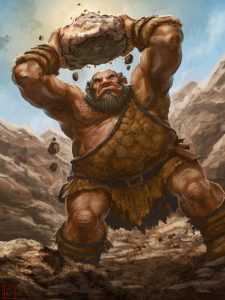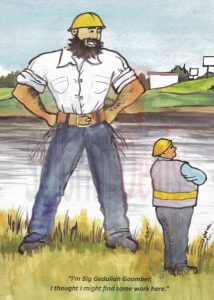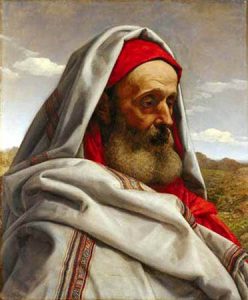Oig the Giant, Mi’cho’ale the Angel & Eliezer the Slave
In this, our eighth review of parshas Lech Lecha, we will not again be delving into Avrom’s adventures with his wife Sorai, nor how she ended up -twice- in the King’s Palace (two different kings), and boudoir. We have previously -more than once- covered this topic; you are encouraged to find those details and a few interesting medroshim by clicking onto archives over at www.oisvorfer.com.
We will instead begin (and likely also end) our review of Parshas Lech Lecha with the pisukim which describe -in unusual great detail- a war which took place between four kings and five kings, a war you likely don’t remember. Though the heylige Toirah is not a history book -so the rebbe told us and knocked into our heads with his shtekin- and zicher every story recounted, is there to teach us something- admittedly, at times we need to struggle to figure out just what that is. This week, the heylige Toirah dedicates a full 24 pisukim (verses) to the very detailed description of this most unusual war between the kings. The bottom line of the battle was this: the four kings defeated the five kings. The underdogs won and shoin! While looting and ravaging the cities of S’doim and Amoira (Sodom and Gomora) which they emptied of all possessions, they also captured and held -as either a hostage, or a prisoner of war- this fellow named Loit who happened to be Avrom’s nephew. Oy vey!
 A few pisukim earlier (and before the war), we learned that both Avrom and Loit were rich in cattle, both had many heads. That was good. Ober it appears that the vast grazing area in the very large swaths of empty land was seemingly not quite large enough to accommodate the herds and shepherds that belonged to both Avrom and Loit. Avrom suggested, then demanded, that they part ways. Loit, for reasons we will discuss next week when the medrish lambastes him for moving near S’doim (suggesting that he was seemingly attracted to the chazerishe lifestyle of its inhabitants, if you chap), also moved his entire family, including a few single daughters -who will also be featured next week- as well, his possessions, and pitched his tent in S’doim. His tent will be pitched yet again, twice, if you chap; stay tuned for that givaldige myseh.
A few pisukim earlier (and before the war), we learned that both Avrom and Loit were rich in cattle, both had many heads. That was good. Ober it appears that the vast grazing area in the very large swaths of empty land was seemingly not quite large enough to accommodate the herds and shepherds that belonged to both Avrom and Loit. Avrom suggested, then demanded, that they part ways. Loit, for reasons we will discuss next week when the medrish lambastes him for moving near S’doim (suggesting that he was seemingly attracted to the chazerishe lifestyle of its inhabitants, if you chap), also moved his entire family, including a few single daughters -who will also be featured next week- as well, his possessions, and pitched his tent in S’doim. His tent will be pitched yet again, twice, if you chap; stay tuned for that givaldige myseh.
Shoin, with Sorai now out of danger and reunited with her husband Avrom, the action picks up just as Avrom got word that his less than favorite nephew was being held prisoner. Ober just how did he find out? And what did he do next? Nu, lommer lernin innaveynig (let’s learn the key verses). Says the heylige Toirah (Bereishis 13 and then 14), azoy:
| 13. And the fugitive came and he told Avrom the Hebrew, and he was living in the plain of Mamre the Amorite, the brother of Eshkol and the brother of Aner, who were Avrom’s confederates. | יגוַיָּבֹא֙ הַפָּלִ֔יט וַיַּגֵּ֖ד לְאַבְרָ֣ם הָֽעִבְרִ֑י וְהוּא֩ שֹׁכֵ֨ן בְּאֵֽלֹנֵ֜י מַמְרֵ֣א הָֽאֱמֹרִ֗י אֲחִ֤י אֶשְׁכֹּל֙ וַֽאֲחִ֣י עָנֵ֔ר וְהֵ֖ם בַּֽעֲלֵ֥י בְרִֽית־אַבְרָֽם: | |
| 14. And Avrom heard that his kinsman had been taken captive, and he armed his trained men, those born in his house, three hundred and eighteen, and he pursued [them] until Dan. | ידוַיִּשְׁמַ֣ע אַבְרָ֔ם כִּ֥י נִשְׁבָּ֖ה אָחִ֑יו וַיָּ֨רֶק אֶת־חֲנִיכָ֜יו יְלִידֵ֣י בֵית֗וֹ שְׁמֹנָ֤ה עָשָׂר֙ וּשְׁל֣שׁ מֵא֔וֹת וַיִּרְדֹּ֖ף עַד־דָּֽן: |
The bottom line: the heylige Toirah does not disclose the identity of the ‘runaway,’ nor do we know the identity of Avrom’s ‘chanichov’ (trained men), the people he armed and got ready for battle. Why not? Azoy iz is (that’s how it is). Efsher it was the RBSO’s plan for people to come along in later generations and proffer different theories as to who the mystery person and persons were. And taka, that’s just what we do. Generations later a Toirah inspired entrepreneur learned the parsha and mistama created the TV show by the name of ’20 Questions,’ followed by another show in that genre by the name of ‘What’s My Line,’ which ran 25 years. Shoin, let’s review. The heylige Toirah tells us that ‘a runaway came’ from the front lines (of the war zone) and informed Uncle Avrom that his relative Loit had been captured. Who was the runaway and what could Avrom do about the situation? Let’s find out. Says Rashi: it’s simple! The unidentified man who broke the news was a fellow by the name of Oig (Ohg). Who was Oig and what’s he doing in our parsha? When was he born and to whom? Did we meet him back in parshas Bereishis? Maybe yes, maybe no. Didn’t he die along with the rest of the world’s inhabitants during the Mabul? Maybe not. Shoin, if you went to yeshiva, zicher you heard the rebbe tell you, that according to many a medrish, though the entire world (excepting Israel, according to some) was destroyed, along with its inhabitants, Oig, who was a giant, somehow managed to hold onto the outside of the Teyvo (ark) and rode out the storm. Oig was a giant? Were his parents tall as well? Moreover, weren’t the waters scolding hot? Indeed they were. Ober, just around Oig’s feet, the waters were cool to the touch; he survived the ride. Shoin: you’re having an issue believing that one tiny factoid of the gantze mabul story? You are fine with the other details? Where is your emunah pishutah (your simple and unquestioned belief), oisvorfs that you are? Oy vey! And taka so says the heylige Gemora (Nidda 61).
 And who named him Oig and why? Nu, for that we need to learn one more medrish and says Rabaynu Bichaya whose insights are mamish taka a michaya to read, azoy: His name may not have been Oig before the incident ober when he arrived to break the news of Loit’s capture, Sorai happened to be baking cookies or matzos for Pesach. Ay (ober) there was no Pesach back then!? Hock-nisht-in-chinik (leave me alone!); don’t you know that our Zeyda Avrom kept the entire heylige Toirah though it was 500 years from his birth in 1948 until Matan Toirah (Revelation) in 2448 and he, Avrom only lived to 175? Moreover, what have cookies to do with this messenger and his name? Shoin, so happens that the Hebrew word for cookies is ugois. The first three letters of the word ugois (the ayin+the vov+the gimmel) spell out the word Oig. Shoin, it was a match and the name Oig stuck. Grada this Oig fellow, though a shtikel protagonist in his later years, and a thorn to the Yiddin, did get to enjoy long life. Eventually Moishe killed him ober that for another day. The medrish will tell us that Oig was rewarded with long life (over 400 years, mistama more than 500) davka because he was the one who informed Avrom about Loit’s capture. Good guy? Seemingly yes! A few others will tell us that he was cooking up a diabolical plot: it was his hope and desire that Avrom, upon hearing the news of Loit’s capture, would go to war attempting to save his nephew, ober that he would get killed in battle. And then what? Ah: then Oig would marry Sorai whom he found very attractive though he looked down on her. Bad guy? Seemingly yes!? Ober how can one guy be so good and so bad? Shoin! Oib azoy (if so), why did Moishe (many hundreds of years later) kill him? Shoin that’s for parshas Chukas where a few months back, we discussed Oig, his height and compared his to the height of Big Gidalya Goomber, certainly the tallest fictional Jew the Oisvorfer ever heard of.
And who named him Oig and why? Nu, for that we need to learn one more medrish and says Rabaynu Bichaya whose insights are mamish taka a michaya to read, azoy: His name may not have been Oig before the incident ober when he arrived to break the news of Loit’s capture, Sorai happened to be baking cookies or matzos for Pesach. Ay (ober) there was no Pesach back then!? Hock-nisht-in-chinik (leave me alone!); don’t you know that our Zeyda Avrom kept the entire heylige Toirah though it was 500 years from his birth in 1948 until Matan Toirah (Revelation) in 2448 and he, Avrom only lived to 175? Moreover, what have cookies to do with this messenger and his name? Shoin, so happens that the Hebrew word for cookies is ugois. The first three letters of the word ugois (the ayin+the vov+the gimmel) spell out the word Oig. Shoin, it was a match and the name Oig stuck. Grada this Oig fellow, though a shtikel protagonist in his later years, and a thorn to the Yiddin, did get to enjoy long life. Eventually Moishe killed him ober that for another day. The medrish will tell us that Oig was rewarded with long life (over 400 years, mistama more than 500) davka because he was the one who informed Avrom about Loit’s capture. Good guy? Seemingly yes! A few others will tell us that he was cooking up a diabolical plot: it was his hope and desire that Avrom, upon hearing the news of Loit’s capture, would go to war attempting to save his nephew, ober that he would get killed in battle. And then what? Ah: then Oig would marry Sorai whom he found very attractive though he looked down on her. Bad guy? Seemingly yes!? Ober how can one guy be so good and so bad? Shoin! Oib azoy (if so), why did Moishe (many hundreds of years later) kill him? Shoin that’s for parshas Chukas where a few months back, we discussed Oig, his height and compared his to the height of Big Gidalya Goomber, certainly the tallest fictional Jew the Oisvorfer ever heard of.
Who the hec is this Oig fellow? Is this his first appearance in the heylige Toirah? Yes and no! He is not found anywhere in the earlier writings and we won’t hear his name again until Sefer Devorim (Deuteronomy) in the summer of 2018 where he gets several shout-outs -eight to be exact- by name. He captured our imagination. Who was he? Where did we hear and read about him? WARNING: what you’re about to read is not found anywhere in the heylige Toirah. It is however found in a few Rashis, various medroshim and in the heylige Gemora. Together, and with mamish healthy doses of creativity and imagination, they spun together his story and resume. Here it is.
Let’s hearken back to parshas Bereishis and let’s read pisukim 1-4 in perek 6.
| 1. And it came to pass when man commenced to multiply upon the face of the earth, and daughters were born to them. | אוַיְהִי כִּי הֵחֵל הָאָדָם לָרֹב עַל פְּנֵי הָאֲדָמָה וּבָנוֹת יֻלְּדוּ לָהֶם: | |
| 2. That the sons of the nobles saw the daughters of man when they were beautifying themselves, and they took for themselves wives from whomever they chose. | בוַיִּרְאוּ בְנֵי הָאֱלֹהִים אֶת בְּנוֹת הָאָדָם כִּי טֹבֹת הֵנָּה וַיִּקְחוּ לָהֶם נָשִׁים מִכֹּל אֲשֶׁר בָּחָרוּ: | |
| 3. And the Lord said, “Let My spirit not quarrel forever concerning man, because he is also flesh, and his days shall be a hundred and twenty years.” | גוַיֹּאמֶר יְהֹוָה לֹא יָדוֹן רוּחִי בָאָדָם לְעֹלָם בְּשַׁגָּם הוּא בָשָׂר וְהָיוּ יָמָיו מֵאָה וְעֶשְׂרִים שָׁנָה: | |
| 4. The Nephilim were on the earth in those days, and also afterward, when the sons of the nobles would come to the daughters of man, and they would bear for them; they are the mighty men, who were of old, the men of renown. | דהַנְּפִלִים הָיוּ בָאָרֶץ בַּיָּמִים הָהֵם וְגַם אַחֲרֵי כֵן אֲשֶׁר יָבֹאוּ בְּנֵי הָאֱלֹהִים אֶל בְּנוֹת הָאָדָם וְיָלְדוּ לָהֶם הֵמָּה הַגִּבֹּרִים אֲשֶׁר מֵעוֹלָם אַנְשֵׁי הַשֵּׁם: |
The heylige Toirah tells us that the Niphilim were then on the earth. The Niphilim had either fallen down from heaven or descended to earth. Why? Some say that two malochim (angels) in a discussion with the RBSO, had told Him they could withstand earthly temptations and live sin-free, as do the angels up in heaven. Shemhazai was one of these rebellious angels. In any event, the medrish will teach us that Oig may have been a grandson of the malach (angel) Shemhazai. Seemingly they came down with earthly bodies. Nu, with earthly bodies they quickly behaved as do humans; very soon thereafter, they were involved in chazerish behavior; they were bedding -as stated in posik 3 above- many women, with and without consent. Yikes! Their offspring were known as the Niphilim, the giants that are described in posik 4. The bottom line: Oig was seemingly from a family that started off as half angel and half human; perhaps that would account for his unusual height? How tall was he? Nu, that depends on how we interpret the words of the heylige Toirah as found in parshas Devorim and which tells us azoy: His bed was made of iron. Why iron? Seemingly the wood could not support his frame. “….Nine cubits was its length and four cubits its breadth, according to the cubit of the man. How large is a cubit? That depends on whom you ask, ober according to all, Oig was very very tall. Some say he was just shorter than his bed which was nine cubits long, others say he was much taller. In height, some have him at only 9 plus feet, others at over 18 feet tall. Certainly, he was over 5′ 10”, and it appears that he was at least a foot taller than Big Gidalya Goomber.
 The bottom line: if this account holds water -and isn’t every medrish 100% emes- (don’t answer that), then Oig was born a few hundred years before Noiach. And when was Noiach born? In the year 1056. Let’s also keep in mind that Noiach was 600 years old at the time of the mabul (flood) in the year 1656. And while we don’t have an exact birthday for Oig, given that Parshas Bereishis is mostly if not totally chronological, again we assume, but cannot confirm, that he was indeed born a few hundred years before Noiach.
The bottom line: if this account holds water -and isn’t every medrish 100% emes- (don’t answer that), then Oig was born a few hundred years before Noiach. And when was Noiach born? In the year 1056. Let’s also keep in mind that Noiach was 600 years old at the time of the mabul (flood) in the year 1656. And while we don’t have an exact birthday for Oig, given that Parshas Bereishis is mostly if not totally chronological, again we assume, but cannot confirm, that he was indeed born a few hundred years before Noiach.
Note, the heylige Toirah is empathic: only Noiach and his family survived. And if Oig predates Noiach and was alive during his times, how the hec did he survive? Nu, let’s see how this question is addressed. From the two Hebrew words “Ach Noiach” whose letters, when added up in gematria language (the total of the numerical value of each Hebrew letter), we come to the number 79. And guess what? The word Oig, when spelled in Hebrew (ayin+ vov + gimmel), and when looked at through gematria (by adding 70 for the ayin, 6 for the vov, and 3 for the gimmel), also come to 79? Shoin, and guess what? Says the medrish (Pirkei D’ Rebee Eliezer 23): 79 = 79 and guess what? Oig also survived the mabul! Was he a stowaway? Not! Of course not! If Oig was taka a giant, mistama, he could not fit into the teyvo and certainly without going unnoticed and unmentioned. Where was he? Says the medrish: Oig, not yet king of Boshon, survived the flood by hitching a ride on the outside of the teyvo. How? Says the medrish (Yalkut Shimoni): Sensing danger, Oig, seemingly promised Noiach that if allowed to ride out the storm, he would become Noiach’s slave or servant for life. Noiach agreed! Noiach then either added a plank which was attached to the back of the teyvo, or cut a hole somewhere, and Oig survived the mabul. Ober how would Oig survive the waters which -as we were taught- were so hot -think molten lava- they wiped out anything alive? Not to worry. Why not? Says the heylige Gemora (Zivochim 113b), azoy: the RBSO performed yet another miracle: though the waters of the mabul were taka scolding hot, the waters immediately surrounding the teyvo were cool to the touch; Oig survived and was not at all hurt. Givaldig? Wait: it gets better, much, and by the time you read of Oig’s exploits, pre and post mabul, you will zicher want to run out and buy every medrish ever printed. Efsher you’re wondering what Oig ate or drank for forty days and nights? As a giant, certainly he needed some nourishment. Did he channel the jolly green giant and survive on a few cans of corn? Not! Seemingly Noiach, built a trap door which he accessed when needed, and fed Oig throughout the excursion. Oig survived the mabul.
 What happened next: Says the heylige Zoihar and who knew more than him, azoy: Oig kept his promise. He went on to serve Noiach and his descendants. Moreover, Oig somehow wound up as one of the servants in the Avrom Ovenu household. The Zoihar also tells us that Oig, as a member in good standing of the Avrom household, also underwent circumcision on his own member. And with that information, let’s move onto parshas Lech Lecha where we read about Oig’s next appearance. Again, he is not mentioned by name, ober, Rashi quoting a few other medroshim, fills us in as to the identity of ‘the stranger’ who suddenly appeared in Avrom’s tent with breaking and critically important news. While Avrom was home relaxing with his wife Sorai (both names later changed to Avrohom and Soro), a fellow came in and told Avrom that his nephew Loit had been taken captive.
What happened next: Says the heylige Zoihar and who knew more than him, azoy: Oig kept his promise. He went on to serve Noiach and his descendants. Moreover, Oig somehow wound up as one of the servants in the Avrom Ovenu household. The Zoihar also tells us that Oig, as a member in good standing of the Avrom household, also underwent circumcision on his own member. And with that information, let’s move onto parshas Lech Lecha where we read about Oig’s next appearance. Again, he is not mentioned by name, ober, Rashi quoting a few other medroshim, fills us in as to the identity of ‘the stranger’ who suddenly appeared in Avrom’s tent with breaking and critically important news. While Avrom was home relaxing with his wife Sorai (both names later changed to Avrohom and Soro), a fellow came in and told Avrom that his nephew Loit had been taken captive.
Says the medrish: while there, the fellow (Oig) laid eyes on Sorai, noticed her beauty, and kept that in mind. Actually he concocted a plan but let’s file that away for a moment. Says Rashi: the unnamed person was Oig who was the lone survivor of his tribe, the Rephaim, and or from the mabul. Seemingly his tribesmen were all killed during the long drawn out war between the four and five kings. What about Sorai’s beauty? Rashi tells us that when Oig laid eyes upon Sorai, he wanted her for himself. But she had something that could knock his eyes out: a husband! What to do? As he reported the news that Loit was taken captive, Oig was secretly hoping that Avrom would of course give chase and try to free his nephew. In Oig’s plan, Avrom would be killed during the pursuit and he, Oig, would then come back and marry Sorai. The RBSO took note of Oig’s chazerishe plan and filed it away. Seemingly, the RBSO has a long memory; yikes! As an aside, though Oig may have been the first to lay eyes on a married woman and secretly hope for her husband’s demise on the war front, he was zicher not the last Toirah character with a plan. Let’s not forget that Dovid Hamelech (King David) too concocted a plan to get rid of a husband, ober that for another time and place.
Shoin, if you’re getting a headache trying chap how Oig was both a good man and a wanted man, you are not alone. Efsher, like most of us, he was both good and flawed. Shoin, no one is perfect! The bottom line: According to Rashi and a few others, it was zicher Oig who delivered the news to Avrom. Loit was in trouble. What to do? We will address that shortly.
Does everyone agree that the runaway (from the war zone) was Oig? Not! Says the Ba’al Haturim, referencing the Pirkei D’rebbe Eleizer (ch 27), azoy: the unidentified person who appeared to Avrom, was none other than the malach (angel) Mi’cho’ale. What was the angel doing here on earth disguised as a human? And how did he get here? Taka excellent questions. Avada there are answers and pshat could be azoy: Some time earlier when the RBSO either threw or sent down the Niphilim, one of them (seemingly they were mostly, or all bad, when they got down to earth) grabbed onto Michoale. What that means, ver veyst, ober the bottom line is that according to some, the ‘polit’ described in posik 13, the ‘war runaway’ who told Avrom that Loit was in distress, was none other than the malach Mi’cho’ale. As an aside, the Da’as Zikanim Miba’alay Hatoisfis agrees and suggests that the unidentified messenger was indeed the angel Mi’cho’ale mistama disguised as a person. Nu, once he was here on earth, we will zicher meet him again; stay tuned for next week’s parsha as Mi’cho’ale, disguised once again as a human, is back visiting Avrom. Ok, let’s go veyter and find out what Avrom did next. Said the posik that Avrom got his people armed and prepared for war. He chased down the four kings, the bad guys who were holding his nephew Loit and rescued him.
Let’s chazir posik 14 above where we are told that Avrom went out to war with a total of 318 people. Vus epes 318 and who were they? Let’s find out. Some say that Avrom taka armed and went out with 318 people. Ober some is zicher not all; some -Rashi included- say that Avrom went out with but one person. Who might that be? None other than Eliezer who was either Avrom’s servant or slave. Some say that King Nimrod (bad guy who threw Avrom into a fiery furnace) was Eliezer’s father and gifted Eliezer to Avrom. Ober how could Avrom go to war with against four kings and their minions with but one Eliezer at his side? Was Eleizer also a giant with superhero powers? Maybe so: says the medrish that the RBSO gave Eliezer the powers of all 318 people. Gishmak!
Ober what happened to the 318 people that Avrom prepared for battle? Says the Da’as Zikanim Mi’balei Hatoisfis azoy: Avrom taka prepared 318 for battle, ober he then made the following announcement: whomever is afraid to go to battle as a result of his own sins, should return to his own house. What happened next? 317 men turned around and went home. Who was left but one person and that one person was Eliezer. As an aside, over in parshas Chukas we will taka read that the war Koihen (priest) would make a similar announcement. Veyter. More proof: the name Eliezer -again, when spelled using Hebrew letters- and when the value of each of the letters is totaled, comes to 318. Shoin: Eliezer alone it was. Ibn Ezra says that Avrom did arm and did go out with 318 men. Another view: Avrom did take 318 men which taka does = to Eliezer’s name. Vus epes that number? Davka because the merits of Eliezer were equal to the merits of all 318 combined. Gishmak. Ober says the Rabaynu Bichaya, azoy: if the heylige Toirah tells us and it does, that Avrom armed and readied 318 people, who are we to come along and suggest that only Eliezer accompanied Avrom? What then is taka pshat? Says he so gishmak azoy: it’s taka emes that 318 went to do battle, ober the war was won in the zichus (merit) of one good man by the name of Eliezer.
 Ober who was this Eliezer fellow? Nu, believe it or not, one Gemora (Nidda 61A) tells us that Eliezer was none other than Oig himself. Well blow me down. How could Oig be Oig and Eliezer at the same time? Nu, when it comes to Medrish anything is of course possible; at times, even true. Which times? Ver veyst. Ober listen to this amazing medrish as described in the Sefer Hadoiris (Elef Hashlishi).
Ober who was this Eliezer fellow? Nu, believe it or not, one Gemora (Nidda 61A) tells us that Eliezer was none other than Oig himself. Well blow me down. How could Oig be Oig and Eliezer at the same time? Nu, when it comes to Medrish anything is of course possible; at times, even true. Which times? Ver veyst. Ober listen to this amazing medrish as described in the Sefer Hadoiris (Elef Hashlishi).
Says the Pirkei D’rebbe Eliezer (98:7), azoy: Eliezer, the servant of Avrom, because he did a kindness with Yitzchok (not yet born in our parsha) by going out to find him (Yitzchok) a wife when he was approximately 40 years old, was emancipated by Avrom. At the same time the RBSO rewarded him this same kindness and willed it so that he would eventually become a king. And taka he came to be known as Oig, King of Bashan. In other words: Eliezer himself had a name change and was known as Oig. Wait there’s more to this fantastical medrish. One time, Avrom yelled at Eliezer and from the fright, Eliezer’s teeth fell out. Avrom collected the teeth and made a bed out of them on which he slept. Ober, others disagree: they say that Avrom only made a chair out of the teeth, and that Avrom sat on that chair all his days. Want more? Here we go. Let’s recall that Oig was a giant. What does a giant eat? Says the Gemora: he ate 1,000 oxen (seemingly daily), a similar amount of other wild animals, he drank 1000 measures of some liquid, and say it’s not so, his droplets of sperm measured 39 litrin (some measurement known at that time). Whether or not litrin are liters that we know today, we are not told. Why the heylige Gemora saw fit to teach us about his sperm production, ver veyst and is zicher above the Oisvorfer’s pay grade to chap. Efsher the heylige Gemora knew that by mentioning his sperm output, that you would also recall other factoids about Oig? Seemingly they were right! Such information must be studied in the kabola and by similar writings who chapped such lofty concepts and certainly discuss them. Just where did the Oisvorfer dig up this amazing myseh of Avrom yelling at Eliezer, Eliezer losing his teeth and the descriptions of what Oig ate, drank and his sperm production? In a brysa known as Maseches Soifrim (Tractate Soifrim 21:9) which is to be found in the back of Tractate Avoido Zoro. FYI: this tractate was written at approximately the same time as was the Mishneh and years before the heylige Gemora was codified.
How did Avrom come to possess a slave of this size? According to some, Oig or Eliezer, whomever he was, was gifted to him by King Nimrod, himself not such a good guy. Shoin and now you know why it’s avada good and entertaining to read midrash. Gishmak. Bottom line: according to this view the runaway who told Avrom that Loit was taken, was Oig. Who was Oig? Eliezer. Shoin, go argue.
Shoin, now you of course know -or don’t- two things. 1- Every medrish and pshat is of course emes; some just didn’t take place (yet). 2- That if you take 2 or maybe 3 Advil and lay down, your headache from trying to figure out who these people really were, might just go away when you wake up.
The bottom line is azoy: for reasons we cannot chap, the RBSO elected not tell us who the Polit (runaway) person was; all these medroshim are merely trying to fill the great lacunas left in the script. And the same is emes when it comes to figuring out how many, and with whom Avrom went to war with, to redeem Loit from bondage. Could it be that Avrom, through ruach hakoidesh (divine spirit and inspiration) with which he was seemingly imbued, already knew that Loit needed to be kept alive? And why was that? Efsher he knew that from Loit’s loins, assisted by his two daughters, if you chap, that generations later, a good woman by the name of Rus (Ruth) would be born, and a few generations later, no lesser a giant than Dovid Hamelech (king David) would emerge, to be followed one day soon, by the Moshiach himself.
Whether he went with one or 318, and whether he went with Oig, Eliezer, or anyone else, is not important. What’s important is that Uncle Avrom did not sit idly by when he heard that this nephew Loit -with whom he had somewhat of a contentious relationship with- was in trouble. He wasted no time. In posik 13 he found out and in posik 14 he was ready to battle. Uncle Avrom, with either one person or 318 did defeat the four kings and did free Loit.
Efsher that was the greatness of Avrom: Loit, who was either a shtikel tzadik, or a shitkel wicked, and mistama both -as are most of us- was in trouble. Still Avrom went out to save him. We should all efsher learn a lesson from our zeyda Avrom: when a mishpocho member, a chaver, or anyone else we know -even if we have a love/hate relationship with that person, is in distress, we need to act with alacrity.
A gittin Shabbis
The Heylige Oisvorfer Ruv
Yitz Grossman

